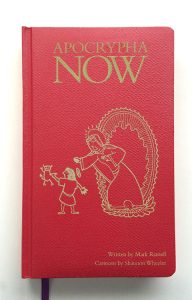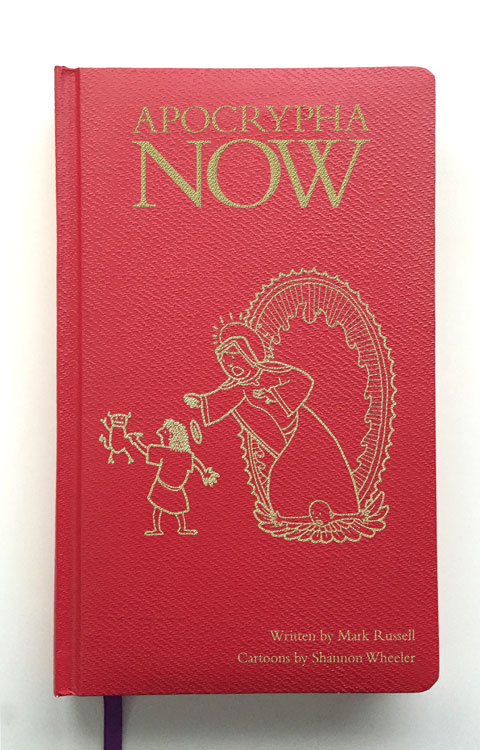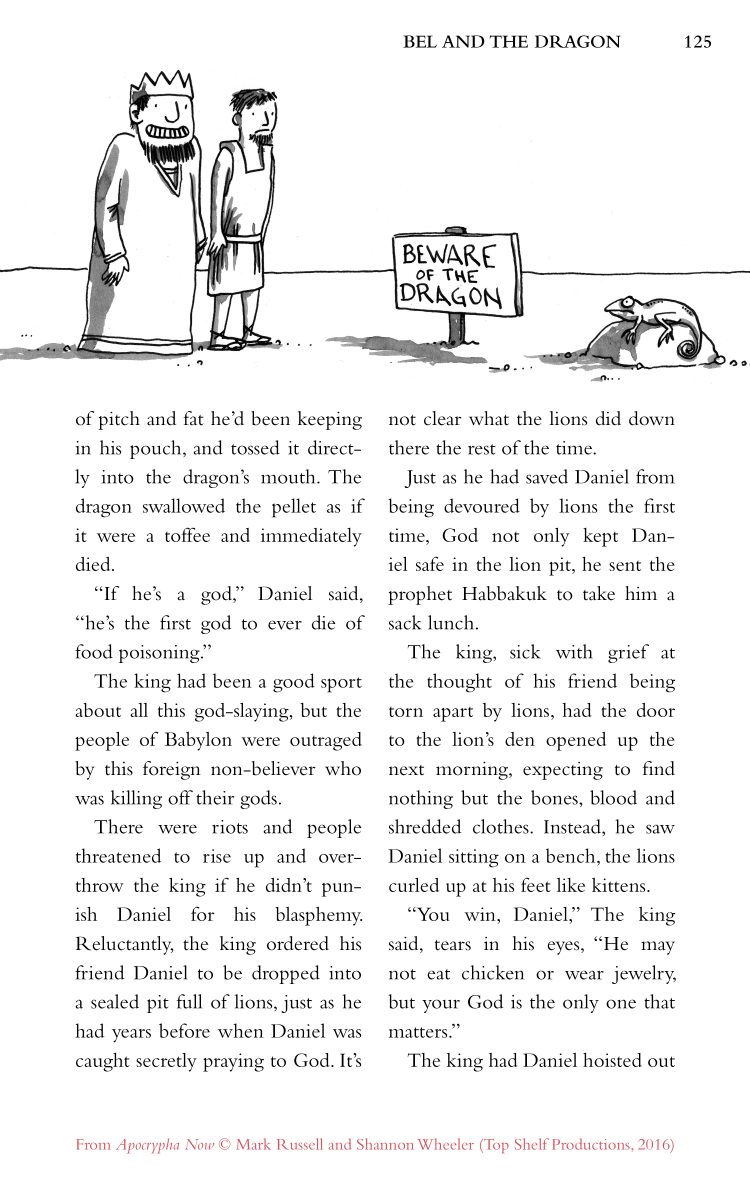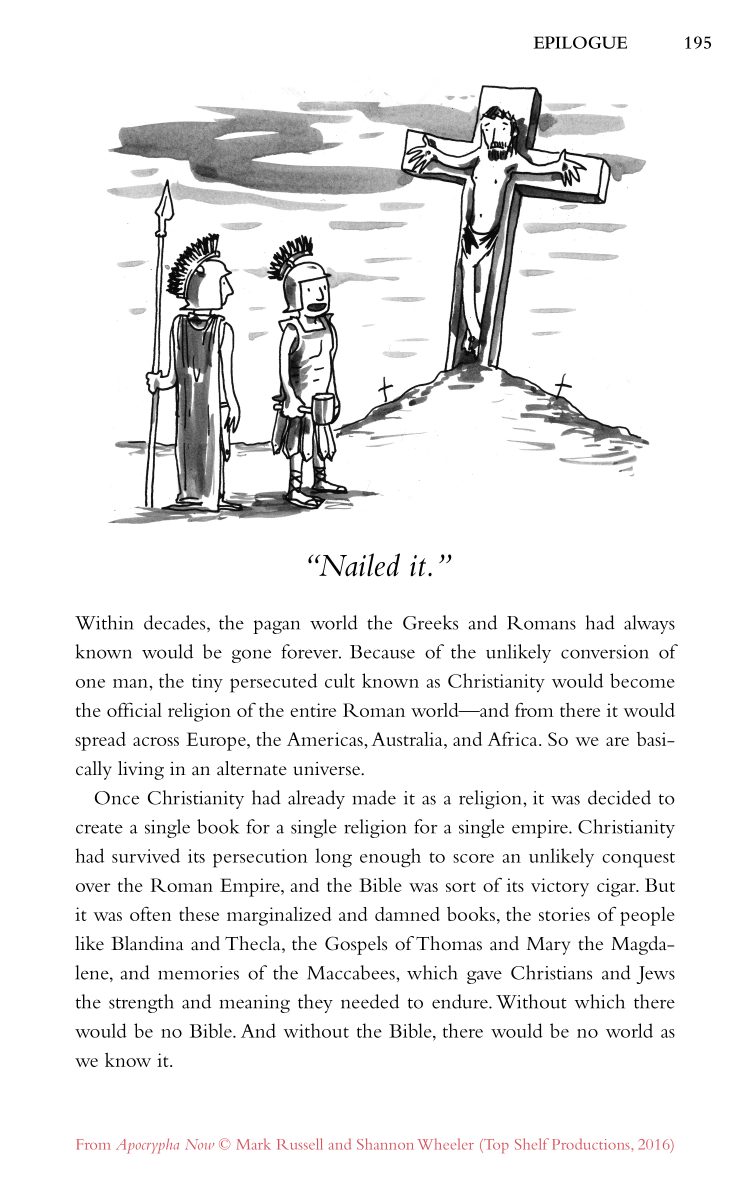
We’re talking to the creators of the book about their view of theology today and how surprising it is to have made such a well received book that was by all accounts intended to be rejected by religious zealots.
David Nieves: Let’s start out by talking about the previous release, God is Disappointed in You. What was it like for both of you to see such acceptance of the book from groups who would normally take anything that questions the bible and use it as kindling for burning more hedonistic things?
Mark Russell: It was a big relief for me. I tried to approach the Bible as honestly and as devoid of an agenda as possible. I was worried that this approach might make the book too irreverent for believers and not critical enough for non-believers. Luckily, I think both groups seem to get what I’m doing and are genuinely interested in hearing about the Bible from someone who wasn’t trying to sell them on it or rub their faces in its errors.
Shannon Wheeler: We anticipated a backlash against God is Disappointed in You, so it was a surprise when we found acceptance with religious groups. We didn’t set out to offend anyone. Our motivation was to understand the Bible. I expected the worst. It’s great to be so wrong.
Nieves: What are your religious backgrounds, if any?
Russell: I was born and raised a Christian fundamentalist. Today, I’m mostly into Game of Thrones.
Nieves: I do love their Sunday mass!
Wheeler: Growing up, I watched a lot of movies based on Bible stories.
Nieves: The Matrix!
Nieves: So what was left unaccomplished in GIDIY which made you both come back to do Apocrypha Now?
Russell: In the process of researching God Is Disappointed in You, I came across so many great stories that weren’t in the Bible—Bel and the Dragon; The Testament of Solomon, which is about Solomon using a magic ring to capture demons and turn them into construction workers; and the Infancy Gospel of Christ, which is part Wonder Years episode, part Anthony from the Twilight Zone. It would have been a shame to leave so many great stories on the table. Especially since the people who wrote the Bible often used them for reference material.
Wheeler: I only had to hear that there were stories about kid Jesus and I was sold. The other stories were just cherries on top. The book is a like a bowl full of cherries. Maybe it’s a cherry pie with whip cream after a nice dinner. The really cute waitress brings a great cup of hot coffee and flirts a little more than she needs to. Then your buddy surprises you by picking up the tab. Your conversation is great and you laugh a lot. It’s a perfect evening and before you know it they’re closing down the restaurant and you’re the last ones there. In answer to your question, why not do another book?
Nieves: I wish creators could write their own book endorsements. Three quarters of what you said would be there.
One of the chapters that illustrated just how much room is left for interpretation (even after centuries of Biblical cannon) was the section about Moses. Specifically how PR friendly the story in the Bible is compared to what could have actually been happening, which is illustrated marvelously in Apocrypha Now. The Egyptians most certainly used spin tactics to enslave the Israelites; comparable to what some big corporations today would use to keep their minimum wage workers in check. On the tail end of that I wonder; have you ever looked at any evidence that might explain why it took forty years to walk the desert while Forrest Gump can run cross county in two weeks?
Russell: Yeah, the oral tradition the Biblical canon comes out of often weaves a more interesting, nuanced account of these events than we get in the approved-for-mass-consumption Bible. There are a lot more details that make sense of stories more or less glossed over in the Bible. In the example you cite, the journey from Egypt to the Promised Land wasn’t an easy nature hike ruined by poor GPS or something. According to Jewish lore, as it appears in Apocrypha Now, the Israelites had to fight off giant snakes and take down the Amalekites, an enemy tribe who would kill them, sever their circumcised penises, and throw them mockingly up at God. God didn’t like having dicks thrown in his face. Nobody does. So the Israelites had to settle a lot of hash before getting to the Promised Land.
Wheeler: “Don’t pay attention to the man behind the curtain.” Some themes are universal.
Nieves: Writers can research for years to script works based in important periods of history like wars, the Great Depression, or the 80’s; How long did it take to go through centuries old research to create Apocrypha Now? On that same note how do you decide what facts to state from the canon and which to change in order to entertain the reader?
Russell: As a rule, if I emphasized a part of a certain story in God Is Disappointed in You, I emphasized other parts of the story in Apocrypha Now, both to give the reader more of a story overall, and to highlight the differences between the Bible and these non-canonical works. Luckily, a lot of the research I did while writing God Is Disappointed in You was also applicable to Apocrypha Now, so it didn’t take me as long to write. For Apocrypha Now, I usually chose to cover texts that told the best stories or that filled in gaps missing in the Bible. Luckily, I could skip stories or texts that weren’t particularly interesting, a luxury I didn’t have in writing God Is Disappointed in You, where I had committed to covering all sixty-six books of the Holy Bible.
Wheeler: It took over 3 years for us to do God is Disappointed in You. Apocrypha was easier but it still had challenges. The stories aren’t as well known. I draw a whale and everyone knows the basic story of Jonah and the Whale. I draw a dragon and people say “what the hell is a dragon doing in the bible?” so Bel and the Dragon needs an explanation.
Nieves: The illustrations make the on the chin punches these stories throw feel less like blasphemy and more towards dialogue starter. Where there any that didn’t make the book or had to be pulled back a bit?
Wheeler: There were a couple cartoons we were on the fence about. Our goal wasn’t to offend. We’d include a cartoon if it had something to offer. Roman soldiers standing in front of a crucified Christ, and one says proudly, “Nailed it,” almost didn’t make it in. But that cartoon shows misplaced pride. The cartoon actually has a point; be careful what you’re proud of because you might, in context of history, be a villain. And I’ve always hated the ‘nailed it’ meme.
Nieves: In the next book please find a way to draw a Christian cheese store named Jesus Take The Wheel. But that’s a problem for future Shannon.
I love one of the lines in the epilogue about Christianity’s beginnings were basically a cult built around a dead guy in order to evade taxes. It makes one think about how many things followed the bible blueprint. In all the films and books you’ve read; who’s done the best job of ripping off biblical cannon?
Russell: It’s hard for me not to see the Bible in pop culture. It’s in everything. Like asbestos. When Merle Haggard died, they were playing Pancho & Lefty on the radio and I thought, “Wait, is this song the story of Christ and Judas?”
Wheeler: I have a list of movies about Jesus that aren’t about Jesus. My favorite is Stranger than Fiction. I need to start a sub-list of movies where Dustin Hoffman plays the Devil. Almost any movie about martyrdom is a movie that, at the very least, tips it hat to Jesus.
Nieves: Are there any Biblical outtakes you’ve left out that you might want to tell in the future? Would it be too easy to do a book like Apocrypha Now on Scientology?
Russell: If I were to write a third book about the Bible, it would probably be about all the interpretations and religious movements that have grown out of it in the last two thousand years: The Anabaptists, the Mormons, the Millerites, etc. The Millerites followed a guy named William Miller who had meticulously used verses in the Bible to predict that the world would end on March 21st, 1844. He worked tens of thousands of people into a lather. Men quit their jobs, families moved to the middle of nowhere, and when that date came and passed without incident, he tried pushing the date back a few times, but eventually people got sick of all his do-overs and stopped listening to him. A faction of these believers became the Seventh Day Adventists.
Religions are started to be relevant to the people creating them. The Jews came up with a religion that revolved around laws and social customs because they were trying to build a new nation from scratch. The Christians living under the thumb of the Roman Empire created a religion that promised salvation. Some Americans, having to explain why God would neglect the salvation of an entire supercontinent and justify their own westward expansion, felt Christianity needed an update. So they came up with Mormonism to make Christianity compatible with the belief systems of Manifest Destiny. The reason why religion is so powerful and so important in people’s lives is not because it tells them what is, but what they need to hear. I think that might make a good book. A book about the ways in which people have used the Bible to hear what they needed to.
Wheeler: I’m game to do any project Mark wants to include me on. I know it will be interesting.
Nieves: Thanks guys for taking the time to do this Friday sermon with us.
For those whose lives are dominated by religious beliefs or even if you mark the atheist box on applications; you should check out the Seinfeldesque look at Biblical cannon called Apocrypha Now; available on Amazon and where books are sold.










